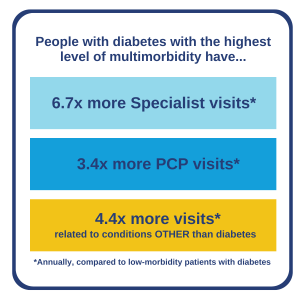Population Health Analytics
Addressing Multimorbidity in Population Health Analytics
|
Population Health Management & Improvement |
Risk Stratification & Population Segmentation
In population health analytics, it’s well understood that patients with multiple chronic conditions—often referred to as “multimorbidity”—present unique challenges for health care systems and providers. These individuals need personalized care plans because they usually have more frequent doctor visits and a greater chance of being hospitalized. Therefore, a comprehensive population health strategy must focus on these complex patients.
A Closer Look at Diabetes
People with diabetes are a great example. Using the ACG System’s Resource Utilization Bands (RUBs), we categorized these patients into four levels of multimorbidity: low, moderate, high, and very high.
Over the span of a year, people with diabetes with the highest multimorbidity levels had six times as many specialist visits, three times as many primary care provider (PCP) visits, and four times more visits for non-diabetes-related issues compared to those with low multimorbidity. While this group represents just 13% of all diabetic patients, they are responsible for 36% of all emergency department visits.

In addition, 43% of people with diabetes who have very high multimorbidity were hospitalized, while less than 2% of those with low multimorbidity were hospitalized. Those with very high multimorbidity are also five times more likely to be readmitted to the hospital within a year. These statistics emphasize a key point: effectively identifying and managing patients with multiple health issues is essential for reducing rising health care costs and resource usage.
Conclusion
While these statistics are specific to diabetes, similar patterns emerge for patients with various complex health conditions. High utilization typically means higher costs. To improve population health outcomes, it’s essential to focus on multimorbidity, which serves as a better indicator of health care resource needs than a singular condition or event.
For more insights on how the ACG System identifies individuals with predicted high health care needs based on multimorbidity, download our infographic.
Visit hopkinsacg.org or contact us at acginfo@jh.edu for more information. If you are a current ACG System customer, reach out to your Account Manager.
Sign up for blog alerts and other insights from the ACG System team
Follow Us








